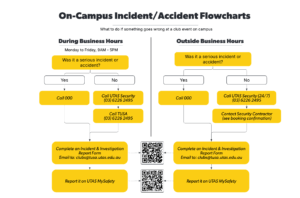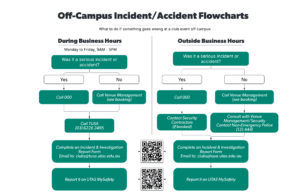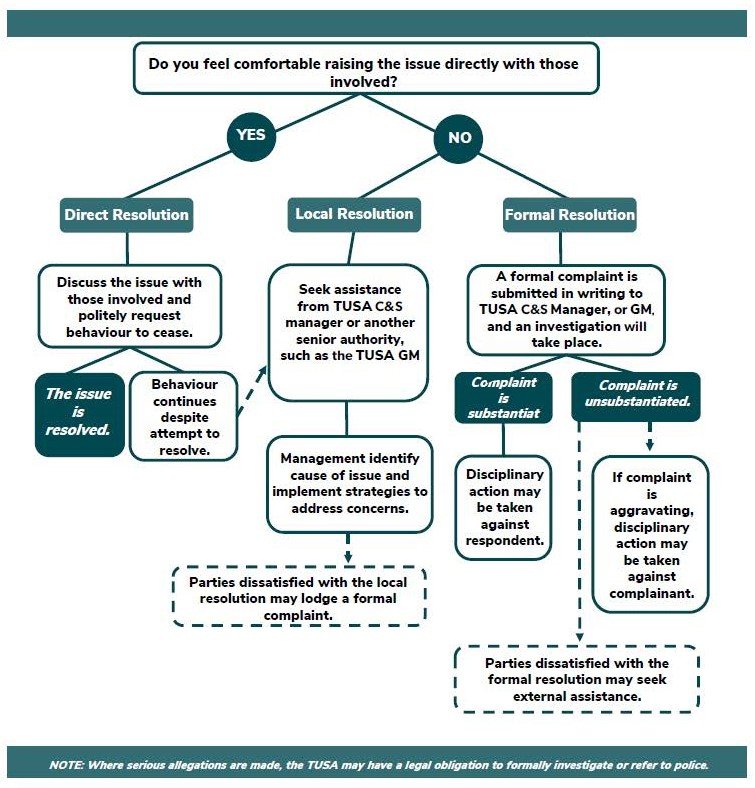Accident & Incident Reporting
Refer the following guide below for reporting steps depending on location (On Campus or Off Campus) and intensity.
Click here to download the Incident & Investigation Report Form, then report the incident to clubs@tusa.utas.edu.au
On-Campus Emergency Guide

Download PDF version here: On-Campus Incident/Accident Flowchart
🔹 MINOR INCIDENT OR ACCIDENT
Call immediately:
- UTAS Security (24/7): 📞 (03) 6226 7600
- TUSA (Mon–Fri, 9am–5pm): 📞 (03) 6226 2495
- Non-Emergency Police: 📞 131 444
Report the incident:
- TUSA + UTAS: Fill out Incident & Investigation Report Form
📧 Email: Clubs@TUSA.utas.edu.au - UTAS Only: Report via MySafety
🔺 SERIOUS INCIDENT OR ACCIDENT
Call emergency services immediately:
- Ambulance / Fire / Police: 📞 000
Also call:
- UTAS Security (24/7): 📞 (03) 6226 7600
- TUSA (Mon–Fri, 9am–5pm): 📞 (03) 6226 2495
For Sexual Assault:
👉 Refer to the Support tab below
Report the incident:
- TUSA Management:
Fill out Incident & Investigation Report Form
📧 Email: Renee.deVilleneuve@tusa.utas.edu.au | ShaunaLee.Ward@tusa.utas.edu.au - UTAS: Report via MySafety
Off-Campus Emergency Guide

Download PDF version here: Off-Campus Incident/Accident Flowchart
🔹 MINOR INCIDENT OR ACCIDENT
Call immediately:
- Venue Management: 📞 refer to Risk Assessment / Contract for venue hire
- TUSA (Mon–Fri, 9am–5pm): 📞 (03) 6226 2495
- Non-Emergency Police: 📞 131 444
Report the incident:
- TUSA + UTAS: Fill out Incident & Investigation Report Form
📧 Email: Clubs@TUSA.utas.edu.au - UTAS Only: Report via MySafety
🔺 SERIOUS INCIDENT OR ACCIDENT
Call emergency services immediately:
- Ambulance / Fire / Police: 📞 000
Also call:
- Venue Management: 📞 refer to Risk Assessment / Contract for venue hire
- TUSA (Mon–Fri, 9am–5pm): 📞 (03) 6226 2495
For Sexual Assault:
👉 Refer to the Support tab below.
Report the incident:
- TUSA Management:
Fill out Incident & Investigation Report Form
📧 Email: Renee.deVilleneuve@tusa.utas.edu.au | ShaunaLee.Ward@tusa.utas.edu.au - UTAS: Report via MySafety
Grievance & Investigation Procedure
The purpose of this procedure is to provide the TUSA affiliated Clubs & Societies’ members with clear guidelines as to how complaints are handled. The procedure seeks to ensure that all disputes and grievances are handled sensitively, confidentially and in a manner consistent with principles of procedural fairness, natural justice and TUSA values.
The full procedure can be found here on the TUSA website.
Grievance & Investigation Flowchart
Download a copy of the flowchart here.

Sexual Assault and Sexual Harassment (SASH) Disclosures and Reporting
- Disclosures are more often than not challenging conversations to have, ensuring that you have the time, space and capacity to have a difficult conversation. As the person to whom the survivor has decided to disclose their experience, your role is primarily to provide a supportive and empathetic environment for them to share their story. Here are some key elements of your role.Active Listening: Listen attentively to the survivor without judgement or interruption. Allow them to express themselves at their own pace and in their own words. Letting the survivor know that you are there to listen whenever they’re ready to share their story is important. It’s essential to respect their pace and comfort level in disclosing their experiences.Validation and Empathy: Validate the survivor’s feelings and experiences by expressing understanding and reassurance. Consider some of the following phrases.
- It took a lot of courage to tell me about this
- I believe you
- I’m here for you
- I’m sorry this happened to you
- It’s not your fault
- You didn’t do anything to deserve this
- This must be really tough for you
- I’m so glad you are sharing this with me
- You are not alone
- I care about you and am here to listen or help in any way I can
- I’m sorry this happened
- This shouldn’t have happened to you
It’s essential to create a safe and supportive environment for individuals to share their experiences without judgement or scepticism. Believing and validating the individual’s experience is crucial in helping them feel heard and supported. By focusing on offering empathy and understanding rather than questioning or investigating their story, focus on creating an environment where the individual feels safe enough to seek professional support and begin their healing journey.
Reassurance and Support: Reassure the survivor they are not alone and that support is available. Let them know you are available to support them and that there are professional resources and assistance available to support their specific needs.
Survivors may experience a wide range of reactions, and it’s important not to make assumptions about how they should or shouldn’t feel or behave. Each person’s response to trauma is unique, and there is no one right way to react.
Respect and Confidentiality: Respect the survivor’s privacy and confidentiality. Keep their disclosure confidential unless they give you explicit permission to share their story or there is legal obligation to report the incident.
It’s important to inform survivors that they have options to seek action against the alleged perpetrator if they choose to do so. While involving the police is one avenue for pursuing legal action, there are also other support services available that can assist both the survivor and the perpetrator.
Provide Information and Options: Offer information about available support services, resources, and options for seeking further help or taking action against the perpetrator, if the survivor wishes to do so. However, you must respect their autonomy and decisions regarding their next steps.
Boundaries and Self-Care: It’s essential to set boundaries for yourself as well. While offering support, ensure that you are not taking on more than you can handle emotionally or mentally. Practice self-care and seek support from other resources if needed.
Remember, your role is primarily to support and validate the survivor, and it’s okay to not have all the answers. Encouraging them to seek professional help from trained counsellors or advocates can also be beneficial in their healing process. Providing information about resources and support organisations that can provide information on SASH (Sexual Assault Support and Help) disclosures and possible next steps for the survivor in getting the right support specific to their needs.
Signs of Vicarious Trauma
Whilst it’s important to support others, it’s also important to make sure you’re looking after yourself and the signs of vicarious trauma as a result of supporting others, if you are observing any of the following in yourself (or others):
- Social withdrawal
- Lack of energy
- Low mood / hopelessness
- Nightmares / sleep problems
- Cynicism
- Disrupted view of the world
- Difficulty switching of
- Irritability
It might be time to set up some practices to support your personal wellbeing. In the following pages some suggested resources to help you navigate your way through.
Support
📞 Sexual Assault Support Services – Quick Reference
| TAS | Sexual Assault Support Service (SASS) – Hobart
Laurel House (North/North East/North West TAS) |
1800 697 877
1800 697 877 |
| NSW | Rape Crisis | 1800 424 017 |
| ACT | Canberra Rape Crisis Centre | (02) 6247 2525 |
| QLD | Sexual Assault Helpline | 1800 010 120 |
| SA | Yarrow Place | 08 8226 8777 |
| VIC | Centre Against Sexual Assault | 1800 806 292 |
| WA | Sexual Assault Resource Centre | 1800 199 888 |
| NT | Ruby Gaea, Darwin Centre Against Sexual Violence
Sexual Assault Referral Centre |
08 8945 0155
08 8922 6472 |
📞 TUSA & UTAS Counselling and Support – Quick Reference
| TUSA | Advocates (online, face to face) | Support@tusa.utas.edu.au
03 6226 2495 |
| Student Legal Service | StudentLegal@yla.org.au
03 7032 8200 |
|
| UTAS | Safe and Fair Community Unit (SaFCU)
https://www.utas.edu.au/about/safety-security-and-wellbeing/safe-and-fair-community-unit |
SaFCU@utas.edu.au
03 6226 2560 |
| Counselling
https://utas.shorthandstories.com/support-services/ Book a counselling appointment online: |
Counselling.services@utas.edu.au
1800 817 675 |
|
| University Crisis Line | 1300 511 709
Or text: 0488 884 168 |
|
| UTAS Security | 03 6226 7600 |
Other Counselling and Support
| Lifeline | 13 11 14 |
| Beyond Blue | 1300 224 636 |
| Suicide call-back service | 1300 659 467 |
| After hours support line | 1300 511 709 or text 0488 884 168
5pm – 9am weekdays 24hrs on weekends and public holidays |
| Stand By
– Support after Suicide |
1300 727 247
Support for witnesses, first responders |
| Urgent Care Clinics | 71 Bathurst St, Hobart |
| Family Planning Tasmania | 03 6273 9117 – 421 Main Road, Glenorchy
06 6343 4566 – 93 Paterson St, Launceston 03 6431 7692 – 199 Mount St, Upper Burnie |
| Sexual Health Service Tasmania
(Clinics 60 and 34) |
03 6166 2672 – Clinic 60, 60 Collins St, Hobart
03 6777 1371 – Clinic 34, 34 Howick St, Launceston |
| Laurel House | 03 6334 2740 – Northern Tasmania
03 6431 9711 – North-West Tasmania |
| Mens Line | 1300 789 978
24hours / 7 days |
| WIRE.org.au | 1300 134 130
Monday – Friday 9am – 5pm |
| 1800 RESPECT | 1800 737 732
Telephone and online counselling, 24hours |
| Women’s Legal Services | www.wlsa.org.au
To assist with legal issues arising out of relationship breakdown and violence. |
| Legal Support | www.australia.gov.au/content/legal-aid
To assist with domestic violence, stalking, assault |
| QLife | 1800 184 527
3pm-Midnight / 7 days Nationwide support services to support LGBTIQ |
| Rainbow Sexual, Domestic & Family Violence Helpline | 1800 497 212
24 hours / 7 days |
| 13 Yarn | 13 92 72
24 hours / 7 days Aboriginal & Torres Strait Islander Crisis Support |
| End Rape on Campus (EROC) | https://www.endrapeoncampusau.org/support-services |
SASH Training for Clubs and Societies
Every year the TUSA provides Sexual Trauma First Aid training with SASS for Clubs and Societies, we require executive committee members to attend this training to support them in this space, should they have the experience of disclosure by a peer. Check out the Learning and Development page on the TUSA website to sign up.